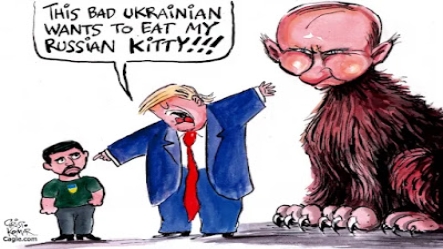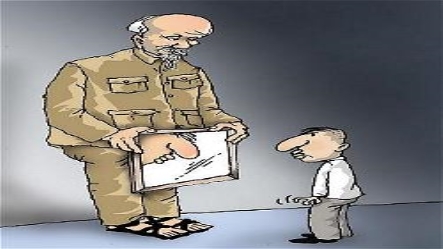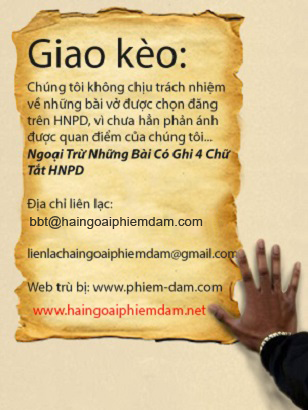Cà Kê Dê Ngỗng
Những con lợn xổng chuồng - Bùi Bảo Trúc
Thực ra những con lợn này không phải lúc nào cũng tệ lậu như thế. Chúng đã từng có một lịch sử cổ xưa, một nếp sống văn hóa, văn minh lâu dài, từng đi được những bước dài đầu tiên cho nhân loại.
Ðọc Nhân Sinh Ðích Nghệ Thuật (Một Quan Niệm Sống Ðẹp do Nguyễn Hiến Lê dịch) và Ngã Quốc Dữ Ngã Dân (Nước Tôi Dân Tôi) của Lâm Ngữ Ðường, người ta thấy ngay những điều ấy. Dân tộc Trung Hoa đã có lúc là đàn anh thiên hạ, coi các nước khác từ Âu sang Á là man di, mọi rợ, cỏ rác hết.
Nhưng từ khoảng một thế kỷ nay, Trung Hoa đã trải qua rất nhiều đổi thay, cả về đất nước lẫn con người khiến cho những nét đẹp của nó đã mất đi rất nhiều. Tác giả Bá Dương sinh ra tại Hoa lục, lớn lên ở Ðài Loan là người có đủ thẩm quyền để đưa ra nhận định đó. Ông từng sống ở cả trong lục địa lẫn Ðài Loan, những chuyến xuất ngoại càng làm cho ông thấy rõ hơn những nét tiêu cực để viết lại trong cuốn Xú Lậu Ðích Trung Quốc Nhân (Người Trung Quốc Xấu Xí do Nguyễn Hồi Thủ dịch sang Việt ngữ), cuốn sách bầy ra tất cả những điều xấu xa của người Hoa ngày nay mà chính Ðặng Tiểu Bình cũng đọc rồi không nói được gì để phản bác lại tác giả Bá Dương. Ông Bá Dương coi nước Trung Hoa của ông là một cái vại tương hôi thối xấu xa, người dân mang tất cả những điều xấu xa tệ lậu nhất ở trên đời này, tranh nhau để sống bằng những trò giành giật ác độc bất nhân nhất.
Gần đây, một người viết phụ nữ ở tuổi rất trẻ, khoảng dưới 30, Echo Wang có viết một cuốn sách, về mặt văn chương không có bao nhiêu, nhưng những ghi chép qua kinh nghiệm của cô đã phản ảnh được rất nhiều về những người cùng gốc gác với cô. Echo Wang không ra đời hay lớn lên ở Hoa Lục. Cô là người gốc Hoa sinh trưởng tại một nước trong vùng Ðông Nam Á, làm việc cho một công ty ngoại quốc, đã từng thăm viếng hơn 40 nước vì việc làm của cô. Trong những chuyến đi đó, cô có dịp quan sát những toán du khách người Hoa từ Trung Quốc. Những điều cô chứng kiến đã làm cho cô kinh hoàng không ít. Những toán du khách này, qua các hành động của họ, đã trở thành những chuyện kinh hoàng cho dân chúng bản xứ vì sự thiếu văn minh và văn hóa của họ mà họ mang theo từ những vùng làng quê Trung Quốc nơi họ sống cả một đời làm lụng vất vả, kiếm được ít tiền rồi rủ nhau đi du lịch để xem thế giới bên ngoài như thế nào. Và nạn nhân của họ là những người sống kề cận với họ ở những nước “núi liền núi, sông liền sông” với họ. Ðó có thể là Thái Lan, Việt Nam... Xa hơn một chút là Malaysia, Singapore, Indonesia... Ðâu đâu người dân của những nước này cũng rất ghê sợ nhóm du khách từ Hoa lục này. Thị trấn Chiang Mai ở Bắc Thái Lan rất cần tiền của du khách nhưng lại rất ghét các du khách người Hoa. Tại một số nước Âu châu, du khách người Hoa cũng bị ghét không ít. Một số khách sạn không tiếp du khách Trung Quốc nêu lý do rất rõ là những trò khạc nhổ, ăn nói ồn ào, không chịu xếp hàng, đánh nhau ngoài đường, ăn cắp... khiến các khách sạn này không muốn tiếp họ.
Mới nhất là khách sạn rất sang trọng Zadig & Voltaire trên đại lộ Grenelle ở tả ngạn sông Seine thủ đô Paris, vừa khai trương năm 2014 đã nói rõ là không cho các du khách từ Hoa lục thuê phòng.
Một số ý kiến cho rằng những nét tốt đẹp của văn hóa Trung Quốc đã bị xóa sạch trong hơn một chục năm cách mạng văn hóa của Mao Trạch Ðông. Du khách từ Hoa lục, mà đa số, căn bản chỉ là những nông dân thất học có ít tiền bầy đặt ra nước ngoài du lịch. Echo Wang gọi những thứ ngợm này là một lũ lợn xổng chuồng thì không một cách mô tả nào chính xác hơn.
Trên một vài chuyến bay của hàng không Việt Nam mới đây phi hành đoàn nhiều lần đã bắt được mấy du khách Trung Quốc trộm tiền bạc của các hành khách Việt Nam ngay trên máy bay. Ðọc những bản tin như thế, nhiều người có thể nghĩ đó chỉ là những trường hợp đơn lẻ, quít Hoài Nam có quả chua, quả ngọt. Nhưng rồi những vụ đánh nhau, hành hung các nữ tiếp viên hàng không Thái trên máy bay, mở cửa máy bay cho... mát đã khiến người ta thấy quả thực những con lợn xổng chuồng này có vấn đề. Du khách Trung Quốc còn cho trẻ con phóng uế ngay trong điện Versailles, Paris, tiểu tiện hồn nhiên trên ghế máy bay, vẽ bậy trên một pho tượng cổ Ai Cập, ném ly nước nóng vào mặt tiếp viên hàng không trên phi cơ...
Và mới đây, chính nhà cầm quyền Bắc Kinh đã phải nhắc nhở các công dân khi ra nước ngoài phải cư xử cho lịch sự tử tế để gìn giữ những hình ảnh tốt đẹp của nước Trung Hoa.
Nhưng lời kêu gọi đó được đưa ra thì đã quá muộn. Bọn lợn đã xổng chuồng đang giở những trò khốn nạn nhất cho thế giới thưởng thức rồi còn gì nữa.

Pigs on the Loose: Chinese Tour Groups
By Echo Wang
Copyright 2012 Echo Wang
Smashwords Edition
This ebook is licensed for your personal enjoyment only. This ebook may not be re-sold or given away to other people. If you would like to share this book with another person, please purchase an additional copy for each recipient. If you’re reading this book and did not purchase it, or it was not purchased for your use only, then please purchase your own copy. Thank you for respecting the hard work of this author.
Table of Contents
第二章:旅游团Chapter 5: Pigs in Restaurants
第七章:污染环境Chapter 11: The Pigs Internet Image
ConclusionIntroduction
I consider myself a very fortunate Chinese because in the last 3 years I have done exceptional things that I never imagined I would have the opportunity to do.
Through both my employment and the people I have met I visited over 23 countries in Asia, Europe and the Middle East.
I have decided to write this book based on things I have seen and comments I have heard.
It looks at the very poor image that Chinese tour groups are promoting overseas. The book is not designed to offend but hopefully wake up the Chinese who read it.
I am not saying that it is just Chinese who have developed poor images overseas. We see previous examples of the ugly American tourists who tell you everything is bigger and better in the USA, the bombastic German tourists, the arrogant French, the drunken boisterous Aussies. All are equally repugnant.
China’s economic success has led to an increase in the numbers of Chinese citizens traveling overseas in large tour groups however they are far from being good ambassadors for the Chinese people. They are giving the Chinese people the reputation of being loud, rude, inconsiderate, unsanitary and environmentally destructive pigs. From what I have witnessed the reputation is well deserved.
I am not the first person to make these observations as many writers have commented about the behaviour of Chinese both at home and abroad. Stories have been published in newspapers, books and on the internet
As part of the process of writing this book I have spent considerable time talking to foreigners about their impressions of China and Chinese tourists.
In places I found that many people did not have a great deal of knowledge about China other than what they read in newspapers or saw on TV. Those who had never visited China always said that they would like to one day.
I remember quite clearly the long conversations I had with foreign travelers while I was staying at the Jaffa Gate Hostel just outside the Old City in Jerusalem. These people were only too happy to tell me their impressions and experiences with Chinese tour groups. Apart from a few who had positive things to say, most had negative and less than favorable experiences with these groups.
In most instances, the positive impressions of Chinese travelers and tourists were of those Chinese who traveled as couples or by themselves and were able to speak English. The majority of negative impressions came from the Chinese tour groups who one foreigner described as “pigs on the loose.”
This book will hopefully give an insight to how embarrassing it is becoming to say “I’m from China”
Chapter 1: The Chinese Image

“Many people around the world have the view that China is full of ignorant, uncivilized, Chinese peasants….Unfortunately Chinese tour groups have led to a lot more people having this view”.
-Joseph Sun (Author)
As the number of Chinese tour groups increases so does the number of people who develop a negative image of the Chinese people. Although the Government has implemented a number of programs in China to change the behaviour of Chinese tourists abroad, it seems that these programs have failed.
During my travels I have witnessed many incidents which made me ashamed to be identified as Chinese. I have always been proud of my heritage and when people have often mistaken me as Korean, Thai, Vietnamese and Filipina, I have always corrected them and told them I am Chinese. However I now prefer to keep my national identity secret and if people mistake me as a national from another country I tend to let them think that.
Hopefully the day will come when I can proudly travel overseas and declare to the world that I am Chinese, but at present the “pigs on the loose” prevent me from doing this.
Many people I have met in places such as Europe, the Middle East and Asia ask if I was educated in the West. They see me as being different from most Chinese they encounter from mainland China and assume I have had a Western education. However all my education has been in China.
I think that because I have worked with American and Australian companies, I have learnt much about their societies and the norms of expected behaviour. While most foreigners admire China’s economic success, they have often formed a very poor opinion of the Chinese people. Unfortunately, this opinion is based on what they see Chinese tour groups doing when they visit places outside China.
Tourists who come to China also see the Chinese people in a poor light due to their poor manners and lack of consideration of others. The behaviours they witness in China are the same ones that Chinese Tour groups display overseas.
The Southern Weekend reported, on September 28, 2006, that two Chinese government departments exposed ten sorts of bad behaviours that were not only offensive to foreigners, but should be eliminated from Chinese behaviour at home. These included:
"Littering", "spitting", "snatching bus seats", "queue-jumping", "taking off shoes and socks in public", "speaking loudly", "bad temper and cursing", "smoking in non-smoking areas" and many others.
I often find myself disgusted by displays of what are regarded as typical Chinese habits. I find men who spit in bins and on streets in public particularly disgusting. I was once told by a friend that he often saw beautiful Chinese girls walking along the street and though he was attracted by their beauty, when he saw them spit on the pavement it turned his stomach and they immediately became “ugly Chinese girls”.
Chinese people also need to realize that most people in other countries find the sight of a person walking along a street picking his or her nose or spitting disgusting. It may be acceptable in China but is definitely considered offensive in most other cultures.
People often complain how loudly Chinese people speak when using a mobile phone.
“We got to Venice quite early in the morning and there were very few people about. The magic and beauty of this magnificent city were magnified by the hushed silence and stillness of the early morning. We were given time to wander by ourselves. My friend and I ended up having coffee on the terrace of a café, the table laid with silver and china. We sat opposite the side entrance to a church and were exalted by the stonework and sculpture we could contemplate at leisure. It was one of those totally euphoric experiences that occur so rarely.
Suddenly, the air was rent by horrible screaming, screeching, angry noise – what else, but a middle-aged mainlander bellowing into a mobile phone (not from our tour group I should add). He was standing in the middle of the junction of two cobbled streets not far from where we sat. Everyone in the vicinity looked at him of which he was completely oblivious. One woman went up to him and made it very clear he should be quiet – he completely ignored her. Those very special moments in life are so easily shattered and it’s difficult to put the pieces back together again. What is it that breeds such insensitivity?”
-Barry (Brisbane, Australia)
I remember walking along a street in Nice with some members of a Contiki tour when we encountered a Chinese guy yelling into his phone. One of the guys from New Zealand yelled to him…”Tell your friend to get his hearing aid fixed!” His humorous comment surprised the guy on the phone and he just stared in our direction while the rest of our group broke into laughter. I am sure the comment was wasted as the guy on the phone didn’t seem to understand why people were looking at him and laughing.
I often asked people I met how Chinese people could improve their image:
- Wait for others to leave a lift before trying to get in
Chinese people also need to realize that most people in other countries find the sight of a person walking along a street picking his or her nose or spitting disgusting. It may be acceptable in China but is definitely considered offensive in most other cultures.
People often complain how loudly Chinese people speak when using a mobile phone.
“We got to Venice quite early in the morning and there were very few people about. The magic and beauty of this magnificent city were magnified by the hushed silence and stillness of the early morning. We were given time to wander by ourselves. My friend and I ended up having coffee on the terrace of a café, the table laid with silver and china. We sat opposite the side entrance to a church and were exalted by the stonework and sculpture we could contemplate at leisure. It was one of those totally euphoric experiences that occur so rarely.
Suddenly, the air was rent by horrible screaming, screeching, angry noise – what else, but a middle-aged mainlander bellowing into a mobile phone (not from our tour group I should add). He was standing in the middle of the junction of two cobbled streets not far from where we sat. Everyone in the vicinity looked at him of which he was completely oblivious. One woman went up to him and made it very clear he should be quiet – he completely ignored her. Those very special moments in life are so easily shattered and it’s difficult to put the pieces back together again. What is it that breeds such insensitivity?”
-Barry (Brisbane, Australia)
I remember walking along a street in Nice with some members of a Contiki tour when we encountered a Chinese guy yelling into his phone. One of the guys from New Zealand yelled to him…”Tell your friend to get his hearing aid fixed!” His humorous comment surprised the guy on the phone and he just stared in our direction while the rest of our group broke into laughter. I am sure the comment was wasted as the guy on the phone didn’t seem to understand why people were looking at him and laughing.
I often asked people I met how Chinese people could improve their image:
- Wait for others to leave a lift before trying to get in
- Don’t smoke in elevators
- Don’t urinate in public.
- Hold open doors for people who are right behind you
- Say “excuse me” after you burp/cough.
- Don’t talk when your mouth is full of food.
- Allow women to enter and exit doorways first
The above are just a few examples as the list is almost too long to publish in this book. The Chinese Government has published a lot of material advising people how to behave when traveling. Unfortunately, it appears that it has been largely ignored.
Chapter 2: Tour Groups

Many Chinese choose to travel overseas in organized tour groups. These groups are usually made up of Chinese who do not speak English. They are made up of middle-class people and those who have managed to benefit from China’s economic rise and have the money to take overseas tours. They choose to travel in a group mainly because they do not have the language skills needed to travel alone. They also have a fear of the unknown and feel more secure traveling with a guide, as well as their fellow countrymen. The group also provides them with the support they need to travel without changing any of their disgusting habits. Chinese who travel alone don’t have this support and normally are educated individuals proficient enough in English to understand and accept the social norms in the country they visit. They refrain from spitting, being noisy and other general pig-like behaviour.
Members of these tour groups are often on their first trip out of China and many members of the group have no understanding of other cultures. They tend to be people who believe they are now better than their friends because they can say they have traveled overseas. The group abounds with overstretched egos of people seeking to be noticed. Within the group individuals try to become admired and tend to want to show off and impress other members of the group. They lack self esteem and seek the group’s approval by often trying to appear as if they know more than they do.
A New Zealand woman once described these groups to me as “a flock of sheep and the tour guide is the sheep dog snapping at their heels”. In a way, that is often how it appears. Unfortunately, sheep don’t tend to cause as much trouble or damage as these groups. Perhaps that’s why I found the description “pigs on the loose” to be a much more appropriate description.
The groups are an annoyance in most overseas places for a number of reasons. Besides being seen as noisy, inconsiderate and lacking in manners. They tend to push into queues and block the passage of others. They tend to move along as a group with no awareness of what is happening around them. They often come to a halt on footpaths and outside doorways and block them so other users have to walk around them and onto roads or are forced to squeeze past them. They block other tourists’ views of sites and scenery by massing in viewing areas for long periods. The noise they generate in tranquil, peaceful places ruins the atmosphere for others. They ignore signs such as “no smoking, no loitering and do not touch”. They feel a need to leave a reminder of their visit by writing in Chinese on monuments and other tourist relics.
In many museums they have had to put up signs in Chinese requesting visitors refrain from touching or climbing on exhibits. These signs are not in any other language other than Chinese as Chinese are the worst offenders.
While staying in Florence in 2009 I was invited to the “Red Garter Bar” where I met John Zanetti who was the manager of a four star hotel in the city. The discussion I had with him gave me an insight into why Chinese tour groups are now being excluded by some hotels in Europe.
John told me that the problem with the groups was their total lack of consideration for other guests and total disregard for hotel rooms.
The group was booked into 12 rooms on different floors and their constant movement between different rooms caused noise and annoyance to other guests. Also they ignored the hotel’s ‘no smoking’ rules and often congregated near several rooms on the third floor where the guide and other group members were accommodated. The doors to the rooms were left open so group members could talk from the corridor or between rooms at the top of their voices.
The following morning quite a few guests checked out early, cutting short their stay at the hotel because of the noise and behaviour of this group.
It is not surprising this hotel has a non-advertised “no Chinese groups” policy
The behaviour of these “pig” not only provides a bad image of Chinese people, but also ruins other people’s vacations and holidays as highlighted by the anecdote below.
We went to Phuket at CNY this year. The resort's pool was invaded by a group of Mainland tourists - 3 men and 3 women. All of them proceeded to spit and clear their noses in and around the pool. One guy, in particular, whose spitting prowess was phenomenal, spat at the foot of a British girl sun-baking on a lounge - you've never seen a girl run so fast. In ten minutes the whole pool area was empty except for us and them. I stood up and yelled at the guy to get his attention and then used hand signals to show that spitting wasn't allowed - I'm pretty sure he got the message. Didn't see another soul (including us) in the pool except the mainlanders, until we left the resort.
-Elsie (Ireland)
The groups have created such a bad impression that other nationalities often try to avoid places they go. However, this is not always possible as these groups tend to follow well-established tourist trails and come into contact with many other groups from different cultures. This means that more and more nationalities are forming very poor opinions of the Chinese.
Chapter 3: Pigs at Airports

Chinese tour groups at airports are an embarrassment to China. They display selfish and inconsiderate behaviours when queuing at check in counters. The members of the group join different queues and then all leave their queue to join their friend in the faster-moving queue faster. This results in other passengers having to wait longer.
If two people are traveling together and they each join a different queue, other passengers don’t mind if their partner leaves the slower queue and joins the partner in the faster queue. This is because they are checking in together and it doesn’t add a lot of waiting time to others in the queue. However, when members of a group all move to join a member who has moved to the front of the check-in this causes a lot of anger.
I have been at Denpasar and Singapore airports and witnessed several of these incidents. Other travelers find this type of tour group behaviour not only annoying, but rude and unacceptable. Hence it often results in conflict.
At the Denpasar check-in, a member of a tour group who was third in line called all the other members of his group to the front of the line which meant that the passenger who was in the line before him went from 4th place to 19th place. The passenger was angry at this pushing in and told them to get back in line. The group proceeded to ignore his requests and only when he started shouting and using four letter words did the tour leader come over and try to talk to him. She offered to let him go in front of the group but he refused because it meant that the other passengers behind him would also be pushed further back because of the tour group’s actions.
I actually intervened at this point and explained in Chinese to the leader why he would not accept their offer to check- in in front of them. I also attempted to explain to the group but they totally ignored the requests to return to their place in line. Only when the other passengers started to vocally support the first passenger did the tour group leader call the group out of line to try and explain the problem. The Chinese tour group were both hostile and loud but withdrew in the face of a passenger rebellion.
The pushy behaviour that these pig-like groups display internationally may be common in China but they are going to find that they will not be able to use these inconsiderate, selfish and pig-like manners overseas without generating hostile responses.
In Singapore, I witnessed a similar incident but this time the guy at the check-in desk got out of his chair and instructed the Chinese tour members who had pushed their way to the front to get back in line. He spoke to them in Chinese but again they looked like stupid sheep and ignored him. No one was going to be checking in while he was trying to get these pigs to return to their place in the line. One of the members of the tour group who spoke English yelled out “but we are a group”. I then saw an Australian guy step forward and say very loudly, “If you don’t understand Chinese, I will translate it into English for you…..GET TO THE BACK OF THE FU...KING LINE. His response was greeted with smiles and applause and resulted in the group’s noisy withdrawal.
This type of incident will only increase and responses at airports will become increasingly hostile until such time as these pigs start behaving with good manners and stop giving all Chinese travelers a bad name internationally.
Chapter 4: Pigs on the Planes

I have been unfortunate enough to be on a plane with these groups on several occasions, as well as hearing from other travelers about their experiences with these groups on aircraft. Not only do these groups display complete ignorance toward other passengers, they often put themselves, other passengers and the crew in danger due to their behaviour.
Even on planes where the announcements are made in Chinese, they ignore requests to turn off mobile phones. I observed one woman member of the group using her mobile during takeoff. When told to turn it off by a flight attendant, she became very upset and began to talk loudly with other members of her group before beginning to use the phone again. The man sitting next to me made me laugh when he said the flight attendant should have made her “step outside”.
Another thing I have witnessed on a number of occasions, which has resulted in flight attendants putting themselves at risk during landings, is the way members of these groups continually ignore the seat belt signs and get out of their seats before the seatbelt light is turned off. They open overhead lockers while the plane is taking off, still climbing or landing.
I have even seen one woman leave her seat and attempt to go to the toilet seconds before take off completely ignoring the flight attendant who was yelling at her to sit down. On this occasion the flight attendant had to unbuckle her own seat belt and escort the lady back to her seat while the
|  5:49 AM (10 hours ago) 5:49 AM (10 hours ago) |   | ||
| ||||
Bùi Bảo Trúc
Bàn ra tán vào (0)
Các tin đã đăng
Những con lợn xổng chuồng - Bùi Bảo Trúc
Thực ra những con lợn này không phải lúc nào cũng tệ lậu như thế. Chúng đã từng có một lịch sử cổ xưa, một nếp sống văn hóa, văn minh lâu dài, từng đi được những bước dài đầu tiên cho nhân loại.
Ðọc Nhân Sinh Ðích Nghệ Thuật (Một Quan Niệm Sống Ðẹp do Nguyễn Hiến Lê dịch) và Ngã Quốc Dữ Ngã Dân (Nước Tôi Dân Tôi) của Lâm Ngữ Ðường, người ta thấy ngay những điều ấy. Dân tộc Trung Hoa đã có lúc là đàn anh thiên hạ, coi các nước khác từ Âu sang Á là man di, mọi rợ, cỏ rác hết.
Nhưng từ khoảng một thế kỷ nay, Trung Hoa đã trải qua rất nhiều đổi thay, cả về đất nước lẫn con người khiến cho những nét đẹp của nó đã mất đi rất nhiều. Tác giả Bá Dương sinh ra tại Hoa lục, lớn lên ở Ðài Loan là người có đủ thẩm quyền để đưa ra nhận định đó. Ông từng sống ở cả trong lục địa lẫn Ðài Loan, những chuyến xuất ngoại càng làm cho ông thấy rõ hơn những nét tiêu cực để viết lại trong cuốn Xú Lậu Ðích Trung Quốc Nhân (Người Trung Quốc Xấu Xí do Nguyễn Hồi Thủ dịch sang Việt ngữ), cuốn sách bầy ra tất cả những điều xấu xa của người Hoa ngày nay mà chính Ðặng Tiểu Bình cũng đọc rồi không nói được gì để phản bác lại tác giả Bá Dương. Ông Bá Dương coi nước Trung Hoa của ông là một cái vại tương hôi thối xấu xa, người dân mang tất cả những điều xấu xa tệ lậu nhất ở trên đời này, tranh nhau để sống bằng những trò giành giật ác độc bất nhân nhất.
Gần đây, một người viết phụ nữ ở tuổi rất trẻ, khoảng dưới 30, Echo Wang có viết một cuốn sách, về mặt văn chương không có bao nhiêu, nhưng những ghi chép qua kinh nghiệm của cô đã phản ảnh được rất nhiều về những người cùng gốc gác với cô. Echo Wang không ra đời hay lớn lên ở Hoa Lục. Cô là người gốc Hoa sinh trưởng tại một nước trong vùng Ðông Nam Á, làm việc cho một công ty ngoại quốc, đã từng thăm viếng hơn 40 nước vì việc làm của cô. Trong những chuyến đi đó, cô có dịp quan sát những toán du khách người Hoa từ Trung Quốc. Những điều cô chứng kiến đã làm cho cô kinh hoàng không ít. Những toán du khách này, qua các hành động của họ, đã trở thành những chuyện kinh hoàng cho dân chúng bản xứ vì sự thiếu văn minh và văn hóa của họ mà họ mang theo từ những vùng làng quê Trung Quốc nơi họ sống cả một đời làm lụng vất vả, kiếm được ít tiền rồi rủ nhau đi du lịch để xem thế giới bên ngoài như thế nào. Và nạn nhân của họ là những người sống kề cận với họ ở những nước “núi liền núi, sông liền sông” với họ. Ðó có thể là Thái Lan, Việt Nam... Xa hơn một chút là Malaysia, Singapore, Indonesia... Ðâu đâu người dân của những nước này cũng rất ghê sợ nhóm du khách từ Hoa lục này. Thị trấn Chiang Mai ở Bắc Thái Lan rất cần tiền của du khách nhưng lại rất ghét các du khách người Hoa. Tại một số nước Âu châu, du khách người Hoa cũng bị ghét không ít. Một số khách sạn không tiếp du khách Trung Quốc nêu lý do rất rõ là những trò khạc nhổ, ăn nói ồn ào, không chịu xếp hàng, đánh nhau ngoài đường, ăn cắp... khiến các khách sạn này không muốn tiếp họ.
Mới nhất là khách sạn rất sang trọng Zadig & Voltaire trên đại lộ Grenelle ở tả ngạn sông Seine thủ đô Paris, vừa khai trương năm 2014 đã nói rõ là không cho các du khách từ Hoa lục thuê phòng.
Một số ý kiến cho rằng những nét tốt đẹp của văn hóa Trung Quốc đã bị xóa sạch trong hơn một chục năm cách mạng văn hóa của Mao Trạch Ðông. Du khách từ Hoa lục, mà đa số, căn bản chỉ là những nông dân thất học có ít tiền bầy đặt ra nước ngoài du lịch. Echo Wang gọi những thứ ngợm này là một lũ lợn xổng chuồng thì không một cách mô tả nào chính xác hơn.
Trên một vài chuyến bay của hàng không Việt Nam mới đây phi hành đoàn nhiều lần đã bắt được mấy du khách Trung Quốc trộm tiền bạc của các hành khách Việt Nam ngay trên máy bay. Ðọc những bản tin như thế, nhiều người có thể nghĩ đó chỉ là những trường hợp đơn lẻ, quít Hoài Nam có quả chua, quả ngọt. Nhưng rồi những vụ đánh nhau, hành hung các nữ tiếp viên hàng không Thái trên máy bay, mở cửa máy bay cho... mát đã khiến người ta thấy quả thực những con lợn xổng chuồng này có vấn đề. Du khách Trung Quốc còn cho trẻ con phóng uế ngay trong điện Versailles, Paris, tiểu tiện hồn nhiên trên ghế máy bay, vẽ bậy trên một pho tượng cổ Ai Cập, ném ly nước nóng vào mặt tiếp viên hàng không trên phi cơ...
Và mới đây, chính nhà cầm quyền Bắc Kinh đã phải nhắc nhở các công dân khi ra nước ngoài phải cư xử cho lịch sự tử tế để gìn giữ những hình ảnh tốt đẹp của nước Trung Hoa.
Nhưng lời kêu gọi đó được đưa ra thì đã quá muộn. Bọn lợn đã xổng chuồng đang giở những trò khốn nạn nhất cho thế giới thưởng thức rồi còn gì nữa.

Pigs on the Loose: Chinese Tour Groups
By Echo Wang
Copyright 2012 Echo Wang
Smashwords Edition
This ebook is licensed for your personal enjoyment only. This ebook may not be re-sold or given away to other people. If you would like to share this book with another person, please purchase an additional copy for each recipient. If you’re reading this book and did not purchase it, or it was not purchased for your use only, then please purchase your own copy. Thank you for respecting the hard work of this author.
Table of Contents
第二章:旅游团Chapter 5: Pigs in Restaurants
第七章:污染环境Chapter 11: The Pigs Internet Image
ConclusionIntroduction
I consider myself a very fortunate Chinese because in the last 3 years I have done exceptional things that I never imagined I would have the opportunity to do.
Through both my employment and the people I have met I visited over 23 countries in Asia, Europe and the Middle East.
I have decided to write this book based on things I have seen and comments I have heard.
It looks at the very poor image that Chinese tour groups are promoting overseas. The book is not designed to offend but hopefully wake up the Chinese who read it.
I am not saying that it is just Chinese who have developed poor images overseas. We see previous examples of the ugly American tourists who tell you everything is bigger and better in the USA, the bombastic German tourists, the arrogant French, the drunken boisterous Aussies. All are equally repugnant.
China’s economic success has led to an increase in the numbers of Chinese citizens traveling overseas in large tour groups however they are far from being good ambassadors for the Chinese people. They are giving the Chinese people the reputation of being loud, rude, inconsiderate, unsanitary and environmentally destructive pigs. From what I have witnessed the reputation is well deserved.
I am not the first person to make these observations as many writers have commented about the behaviour of Chinese both at home and abroad. Stories have been published in newspapers, books and on the internet
As part of the process of writing this book I have spent considerable time talking to foreigners about their impressions of China and Chinese tourists.
In places I found that many people did not have a great deal of knowledge about China other than what they read in newspapers or saw on TV. Those who had never visited China always said that they would like to one day.
I remember quite clearly the long conversations I had with foreign travelers while I was staying at the Jaffa Gate Hostel just outside the Old City in Jerusalem. These people were only too happy to tell me their impressions and experiences with Chinese tour groups. Apart from a few who had positive things to say, most had negative and less than favorable experiences with these groups.
In most instances, the positive impressions of Chinese travelers and tourists were of those Chinese who traveled as couples or by themselves and were able to speak English. The majority of negative impressions came from the Chinese tour groups who one foreigner described as “pigs on the loose.”
This book will hopefully give an insight to how embarrassing it is becoming to say “I’m from China”
Chapter 1: The Chinese Image

“Many people around the world have the view that China is full of ignorant, uncivilized, Chinese peasants….Unfortunately Chinese tour groups have led to a lot more people having this view”.
-Joseph Sun (Author)
As the number of Chinese tour groups increases so does the number of people who develop a negative image of the Chinese people. Although the Government has implemented a number of programs in China to change the behaviour of Chinese tourists abroad, it seems that these programs have failed.
During my travels I have witnessed many incidents which made me ashamed to be identified as Chinese. I have always been proud of my heritage and when people have often mistaken me as Korean, Thai, Vietnamese and Filipina, I have always corrected them and told them I am Chinese. However I now prefer to keep my national identity secret and if people mistake me as a national from another country I tend to let them think that.
Hopefully the day will come when I can proudly travel overseas and declare to the world that I am Chinese, but at present the “pigs on the loose” prevent me from doing this.
Many people I have met in places such as Europe, the Middle East and Asia ask if I was educated in the West. They see me as being different from most Chinese they encounter from mainland China and assume I have had a Western education. However all my education has been in China.
I think that because I have worked with American and Australian companies, I have learnt much about their societies and the norms of expected behaviour. While most foreigners admire China’s economic success, they have often formed a very poor opinion of the Chinese people. Unfortunately, this opinion is based on what they see Chinese tour groups doing when they visit places outside China.
Tourists who come to China also see the Chinese people in a poor light due to their poor manners and lack of consideration of others. The behaviours they witness in China are the same ones that Chinese Tour groups display overseas.
The Southern Weekend reported, on September 28, 2006, that two Chinese government departments exposed ten sorts of bad behaviours that were not only offensive to foreigners, but should be eliminated from Chinese behaviour at home. These included:
"Littering", "spitting", "snatching bus seats", "queue-jumping", "taking off shoes and socks in public", "speaking loudly", "bad temper and cursing", "smoking in non-smoking areas" and many others.
I often find myself disgusted by displays of what are regarded as typical Chinese habits. I find men who spit in bins and on streets in public particularly disgusting. I was once told by a friend that he often saw beautiful Chinese girls walking along the street and though he was attracted by their beauty, when he saw them spit on the pavement it turned his stomach and they immediately became “ugly Chinese girls”.
Chinese people also need to realize that most people in other countries find the sight of a person walking along a street picking his or her nose or spitting disgusting. It may be acceptable in China but is definitely considered offensive in most other cultures.
People often complain how loudly Chinese people speak when using a mobile phone.
“We got to Venice quite early in the morning and there were very few people about. The magic and beauty of this magnificent city were magnified by the hushed silence and stillness of the early morning. We were given time to wander by ourselves. My friend and I ended up having coffee on the terrace of a café, the table laid with silver and china. We sat opposite the side entrance to a church and were exalted by the stonework and sculpture we could contemplate at leisure. It was one of those totally euphoric experiences that occur so rarely.
Suddenly, the air was rent by horrible screaming, screeching, angry noise – what else, but a middle-aged mainlander bellowing into a mobile phone (not from our tour group I should add). He was standing in the middle of the junction of two cobbled streets not far from where we sat. Everyone in the vicinity looked at him of which he was completely oblivious. One woman went up to him and made it very clear he should be quiet – he completely ignored her. Those very special moments in life are so easily shattered and it’s difficult to put the pieces back together again. What is it that breeds such insensitivity?”
-Barry (Brisbane, Australia)
I remember walking along a street in Nice with some members of a Contiki tour when we encountered a Chinese guy yelling into his phone. One of the guys from New Zealand yelled to him…”Tell your friend to get his hearing aid fixed!” His humorous comment surprised the guy on the phone and he just stared in our direction while the rest of our group broke into laughter. I am sure the comment was wasted as the guy on the phone didn’t seem to understand why people were looking at him and laughing.
I often asked people I met how Chinese people could improve their image:
- Wait for others to leave a lift before trying to get in
Chinese people also need to realize that most people in other countries find the sight of a person walking along a street picking his or her nose or spitting disgusting. It may be acceptable in China but is definitely considered offensive in most other cultures.
People often complain how loudly Chinese people speak when using a mobile phone.
“We got to Venice quite early in the morning and there were very few people about. The magic and beauty of this magnificent city were magnified by the hushed silence and stillness of the early morning. We were given time to wander by ourselves. My friend and I ended up having coffee on the terrace of a café, the table laid with silver and china. We sat opposite the side entrance to a church and were exalted by the stonework and sculpture we could contemplate at leisure. It was one of those totally euphoric experiences that occur so rarely.
Suddenly, the air was rent by horrible screaming, screeching, angry noise – what else, but a middle-aged mainlander bellowing into a mobile phone (not from our tour group I should add). He was standing in the middle of the junction of two cobbled streets not far from where we sat. Everyone in the vicinity looked at him of which he was completely oblivious. One woman went up to him and made it very clear he should be quiet – he completely ignored her. Those very special moments in life are so easily shattered and it’s difficult to put the pieces back together again. What is it that breeds such insensitivity?”
-Barry (Brisbane, Australia)
I remember walking along a street in Nice with some members of a Contiki tour when we encountered a Chinese guy yelling into his phone. One of the guys from New Zealand yelled to him…”Tell your friend to get his hearing aid fixed!” His humorous comment surprised the guy on the phone and he just stared in our direction while the rest of our group broke into laughter. I am sure the comment was wasted as the guy on the phone didn’t seem to understand why people were looking at him and laughing.
I often asked people I met how Chinese people could improve their image:
- Wait for others to leave a lift before trying to get in
- Don’t smoke in elevators
- Don’t urinate in public.
- Hold open doors for people who are right behind you
- Say “excuse me” after you burp/cough.
- Don’t talk when your mouth is full of food.
- Allow women to enter and exit doorways first
The above are just a few examples as the list is almost too long to publish in this book. The Chinese Government has published a lot of material advising people how to behave when traveling. Unfortunately, it appears that it has been largely ignored.
Chapter 2: Tour Groups

Many Chinese choose to travel overseas in organized tour groups. These groups are usually made up of Chinese who do not speak English. They are made up of middle-class people and those who have managed to benefit from China’s economic rise and have the money to take overseas tours. They choose to travel in a group mainly because they do not have the language skills needed to travel alone. They also have a fear of the unknown and feel more secure traveling with a guide, as well as their fellow countrymen. The group also provides them with the support they need to travel without changing any of their disgusting habits. Chinese who travel alone don’t have this support and normally are educated individuals proficient enough in English to understand and accept the social norms in the country they visit. They refrain from spitting, being noisy and other general pig-like behaviour.
Members of these tour groups are often on their first trip out of China and many members of the group have no understanding of other cultures. They tend to be people who believe they are now better than their friends because they can say they have traveled overseas. The group abounds with overstretched egos of people seeking to be noticed. Within the group individuals try to become admired and tend to want to show off and impress other members of the group. They lack self esteem and seek the group’s approval by often trying to appear as if they know more than they do.
A New Zealand woman once described these groups to me as “a flock of sheep and the tour guide is the sheep dog snapping at their heels”. In a way, that is often how it appears. Unfortunately, sheep don’t tend to cause as much trouble or damage as these groups. Perhaps that’s why I found the description “pigs on the loose” to be a much more appropriate description.
The groups are an annoyance in most overseas places for a number of reasons. Besides being seen as noisy, inconsiderate and lacking in manners. They tend to push into queues and block the passage of others. They tend to move along as a group with no awareness of what is happening around them. They often come to a halt on footpaths and outside doorways and block them so other users have to walk around them and onto roads or are forced to squeeze past them. They block other tourists’ views of sites and scenery by massing in viewing areas for long periods. The noise they generate in tranquil, peaceful places ruins the atmosphere for others. They ignore signs such as “no smoking, no loitering and do not touch”. They feel a need to leave a reminder of their visit by writing in Chinese on monuments and other tourist relics.
In many museums they have had to put up signs in Chinese requesting visitors refrain from touching or climbing on exhibits. These signs are not in any other language other than Chinese as Chinese are the worst offenders.
While staying in Florence in 2009 I was invited to the “Red Garter Bar” where I met John Zanetti who was the manager of a four star hotel in the city. The discussion I had with him gave me an insight into why Chinese tour groups are now being excluded by some hotels in Europe.
John told me that the problem with the groups was their total lack of consideration for other guests and total disregard for hotel rooms.
The group was booked into 12 rooms on different floors and their constant movement between different rooms caused noise and annoyance to other guests. Also they ignored the hotel’s ‘no smoking’ rules and often congregated near several rooms on the third floor where the guide and other group members were accommodated. The doors to the rooms were left open so group members could talk from the corridor or between rooms at the top of their voices.
The following morning quite a few guests checked out early, cutting short their stay at the hotel because of the noise and behaviour of this group.
It is not surprising this hotel has a non-advertised “no Chinese groups” policy
The behaviour of these “pig” not only provides a bad image of Chinese people, but also ruins other people’s vacations and holidays as highlighted by the anecdote below.
We went to Phuket at CNY this year. The resort's pool was invaded by a group of Mainland tourists - 3 men and 3 women. All of them proceeded to spit and clear their noses in and around the pool. One guy, in particular, whose spitting prowess was phenomenal, spat at the foot of a British girl sun-baking on a lounge - you've never seen a girl run so fast. In ten minutes the whole pool area was empty except for us and them. I stood up and yelled at the guy to get his attention and then used hand signals to show that spitting wasn't allowed - I'm pretty sure he got the message. Didn't see another soul (including us) in the pool except the mainlanders, until we left the resort.
-Elsie (Ireland)
The groups have created such a bad impression that other nationalities often try to avoid places they go. However, this is not always possible as these groups tend to follow well-established tourist trails and come into contact with many other groups from different cultures. This means that more and more nationalities are forming very poor opinions of the Chinese.
Chapter 3: Pigs at Airports

Chinese tour groups at airports are an embarrassment to China. They display selfish and inconsiderate behaviours when queuing at check in counters. The members of the group join different queues and then all leave their queue to join their friend in the faster-moving queue faster. This results in other passengers having to wait longer.
If two people are traveling together and they each join a different queue, other passengers don’t mind if their partner leaves the slower queue and joins the partner in the faster queue. This is because they are checking in together and it doesn’t add a lot of waiting time to others in the queue. However, when members of a group all move to join a member who has moved to the front of the check-in this causes a lot of anger.
I have been at Denpasar and Singapore airports and witnessed several of these incidents. Other travelers find this type of tour group behaviour not only annoying, but rude and unacceptable. Hence it often results in conflict.
At the Denpasar check-in, a member of a tour group who was third in line called all the other members of his group to the front of the line which meant that the passenger who was in the line before him went from 4th place to 19th place. The passenger was angry at this pushing in and told them to get back in line. The group proceeded to ignore his requests and only when he started shouting and using four letter words did the tour leader come over and try to talk to him. She offered to let him go in front of the group but he refused because it meant that the other passengers behind him would also be pushed further back because of the tour group’s actions.
I actually intervened at this point and explained in Chinese to the leader why he would not accept their offer to check- in in front of them. I also attempted to explain to the group but they totally ignored the requests to return to their place in line. Only when the other passengers started to vocally support the first passenger did the tour group leader call the group out of line to try and explain the problem. The Chinese tour group were both hostile and loud but withdrew in the face of a passenger rebellion.
The pushy behaviour that these pig-like groups display internationally may be common in China but they are going to find that they will not be able to use these inconsiderate, selfish and pig-like manners overseas without generating hostile responses.
In Singapore, I witnessed a similar incident but this time the guy at the check-in desk got out of his chair and instructed the Chinese tour members who had pushed their way to the front to get back in line. He spoke to them in Chinese but again they looked like stupid sheep and ignored him. No one was going to be checking in while he was trying to get these pigs to return to their place in the line. One of the members of the tour group who spoke English yelled out “but we are a group”. I then saw an Australian guy step forward and say very loudly, “If you don’t understand Chinese, I will translate it into English for you…..GET TO THE BACK OF THE FU...KING LINE. His response was greeted with smiles and applause and resulted in the group’s noisy withdrawal.
This type of incident will only increase and responses at airports will become increasingly hostile until such time as these pigs start behaving with good manners and stop giving all Chinese travelers a bad name internationally.
Chapter 4: Pigs on the Planes

I have been unfortunate enough to be on a plane with these groups on several occasions, as well as hearing from other travelers about their experiences with these groups on aircraft. Not only do these groups display complete ignorance toward other passengers, they often put themselves, other passengers and the crew in danger due to their behaviour.
Even on planes where the announcements are made in Chinese, they ignore requests to turn off mobile phones. I observed one woman member of the group using her mobile during takeoff. When told to turn it off by a flight attendant, she became very upset and began to talk loudly with other members of her group before beginning to use the phone again. The man sitting next to me made me laugh when he said the flight attendant should have made her “step outside”.
Another thing I have witnessed on a number of occasions, which has resulted in flight attendants putting themselves at risk during landings, is the way members of these groups continually ignore the seat belt signs and get out of their seats before the seatbelt light is turned off. They open overhead lockers while the plane is taking off, still climbing or landing.
I have even seen one woman leave her seat and attempt to go to the toilet seconds before take off completely ignoring the flight attendant who was yelling at her to sit down. On this occasion the flight attendant had to unbuckle her own seat belt and escort the lady back to her seat while the
|  5:49 AM (10 hours ago) 5:49 AM (10 hours ago) |   | ||
| ||||
Bùi Bảo Trúc



















